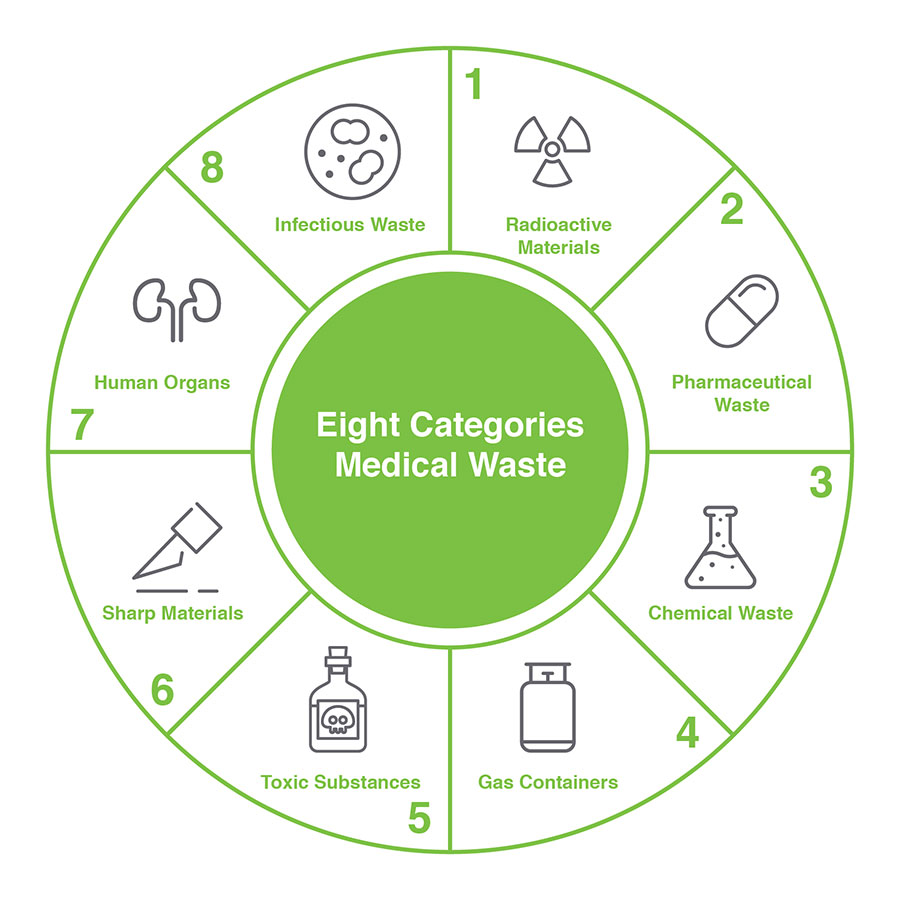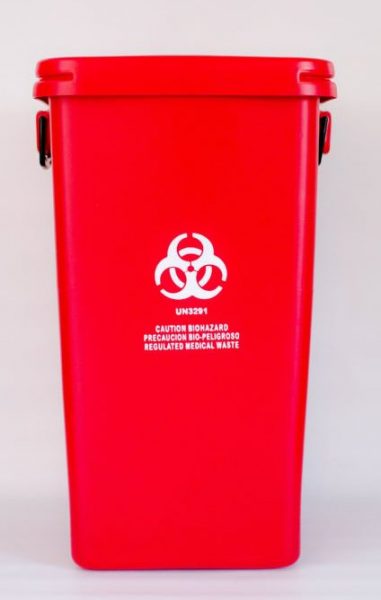Keep Ahead of Regulations: Expert Guidance on Medical Garbage Disposal
In a globe where the healthcare industry is continuously developing, it is imperative for medical facilities to stay ahead of policies when it pertains to the appropriate disposal of clinical waste. With rigid standards and constant governing adjustments, it can be testing to browse the intricacies of this procedure. With expert guidance, centers can make certain conformity and reduce dangers connected with incorrect waste disposal. From understanding the various categories of medical waste to carrying out the ideal collection and segregation methods, this discussion will certainly supply beneficial insights and actionable tips to aid centers stay ahead of laws in the ever-changing landscape of clinical waste disposal.
Comprehending Clinical Waste Categories
Comprehending clinical waste categories is crucial for proper disposal and monitoring in healthcare centers. Clinical waste refers to any type of waste created by health care tasks that might position a hazard to public health or the atmosphere. It is crucial to categorize clinical waste properly to ensure its risk-free handling, treatment, disposal, and transportation.
There are several groups of clinical waste that healthcare facilities require to be acquainted with. One of the most common classifications consist of infectious waste, pathological waste, sharps waste, pharmaceutical waste, and chemical waste. Each classification has certain standards and regulations for its proper administration and disposal.
Pathological waste refers to human tissues, organs, or body parts that call for unique handling and disposal. Drug waste makes up expired, unused, or infected medicines that require cautious handling and disposal.
Staying Up-To-Date With Regulatory Changes
Remaining present with regulative modifications is important for healthcare facilities to make certain conformity and appropriate management of medical garbage disposal. medical waste removal service. With policies constantly advancing, it is necessary for health care facilities to remain current to avoid fines, penalties, and potential injury to the atmosphere and public health
To remain ahead of governing changes, medical care facilities should develop a system for monitoring and monitoring updates. This can be done by signing up for regulatory e-newsletters, attending meetings and workshops, and proactively joining industry associations. In addition, facilities should designate a team member or group responsible for staying educated and distributing details to relevant stakeholders.
Routine communication with regulative firms is also crucial. Healthcare facilities need to establish connections with neighborhood, state, and federal companies to guarantee they recognize any type of adjustments in policies that might influence their waste management methods. This can be done via regular meetings, involvement in public remark durations, and proactive interaction with regulative firms.
In addition, health care facilities must consider partnering with waste administration companies that focus on clinical waste disposal (medical waste disposal services with WasteX). These business are commonly fluent in the current policies and can supply advice and assistance to ensure compliance
Executing Appropriate Collection and Segregation Techniques
To successfully take care of clinical waste disposal, health care facilities should establish appropriate collection and segregation methods in conformity with regulative standards. Applying these techniques guarantees the safe handling and disposal of potentially hazardous materials, protects the setting, and decreases the threat of injuries and infections to medical care employees and the public.
Appropriate collection and segregation methods entail making use of assigned containers and labeling systems. Healthcare centers must supply clearly labeled containers for various kinds of clinical waste, such as sharps, transmittable waste, pharmaceutical waste, and non-hazardous waste. These containers need to be color-coded and plainly significant to avoid confusion and advertise simple identification.
In addition, health care facilities need to train their staff on the proper treatments for collecting and setting apart medical waste. This consists of informing this page them on the different sorts of waste, the proper containers to use, and the relevance of complying with guidelines and laws. Routine training sessions and refresher programs should be performed to guarantee that personnel continue to be up-to-date on ideal methods.
In addition, health care centers ought to develop a system for regular collection and disposal of clinical waste. This might involve partnering with qualified waste management firms that specialize in clinical garbage disposal. These companies will certainly ensure that the gathered waste is transported and thrown away in compliance with regulative needs.
Choosing the Right Disposal Techniques

Incineration is among the most efficient and typical techniques for disposing of certain sorts of medical waste, such as pathological waste and sharps. It involves the regulated burning of waste at high temperatures, reducing it to ash. Incineration can launch dangerous toxins into the air and contribute to air pollution.

Chemical treatment involves the use of chemicals to sanitize and reduce the effects of the waste. Microwave therapy makes use of microwave power to warmth and decontaminate the waste.
Ensuring Conformity Via Documents and Training
After carefully considering the appropriate disposal methods for clinical waste, medical care centers have to make certain conformity with regulations and reduce environmental effect by implementing effective documents and training procedures. This step is essential in keeping a secure and sustainable atmosphere for both health care workers and the general public.

Health care workers who deal with medical waste ought to receive suitable training on waste segregation, dealing with, and disposal procedures. By providing comprehensive training, healthcare facilities can encourage their medical waste disposal services with WasteX team to make enlightened choices and lessen the danger of incorrect waste disposal.
Conclusion
In conclusion, remaining in advance of guidelines in medical waste disposal is essential for healthcare centers. medical waste removal. Recognizing the various classifications of medical waste, remaining upgraded with regulative changes, applying correct collection and segregation methods, picking the proper disposal methods, and ensuring conformity with documentation and training are all crucial actions. By complying with these guidelines, healthcare companies can efficiently manage and get rid of of medical waste in a responsible and secure manner
From recognizing the different groups of medical waste to applying the ideal collection and segregation techniques, this discussion will certainly provide actionable suggestions and important insights to assist facilities remain ahead of laws in the ever-changing landscape of medical waste disposal. - medical waste disposal services with WasteX
The most typical groups consist of infectious waste, pathological waste, sharps waste, pharmaceutical waste, and chemical waste. Healthcare facilities ought to supply plainly classified containers for various kinds of clinical waste, such as sharps, transmittable waste, pharmaceutical waste, and non-hazardous waste. Medical care centers should establish a comprehensive system to tape-record and track all aspects of medical waste disposal, including types of waste generated, quantities, and disposal approaches made use of. Medical care employees that take care of clinical waste must get proper training on waste partition, managing, and disposal procedures.